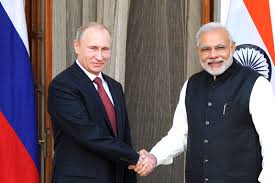 Prime Minister Narendra Modi has been ranked as the world’s ninth most powerful person by Forbes magazine in a 2015 list which is topped by Russian President Vladimir Putin.Modi was placed 14th in the 2014 Forbes list of world’s powerful people.
Prime Minister Narendra Modi has been ranked as the world’s ninth most powerful person by Forbes magazine in a 2015 list which is topped by Russian President Vladimir Putin.Modi was placed 14th in the 2014 Forbes list of world’s powerful people.
Forbes while releasing the list today at the same time said governing 1.2 billion people in India requires more than “shaking hands” and that Modi must pass his party BJP’s reform agenda and keep “fractious opposition” under control.
German Chancellor Angela Merkel is at the second spot followed by US President Barack Obama (third) and Pope Francis (fourth) and Chinese President Xi Jinping (fifth).
Apart from Modi who is at the ninth position, others in the top ten are Microsoft Founder Bill Gates at the sixth place, US Federal Reserve Chairperson Janet Yellen (7), UK Prime Minister David Cameron (8) and Google’s Larry Page(10)
About Modi, the magazine said that India’s “populist” Prime Minister presided over 7.4 per cent GDP growth in his first year in office, and “raised his profile” as a global leader during official visits with Barack Obama and Xi Jinping.
“A barnstorming tour of Silicon Valley reinforced his nation’s massive importance in tech. But governing 1.2 billion people requires more than shaking hands: Now Modi must pass his party’s reform agenda and keep fractious opposition under control,” it said.
To compile the list of world’s most powerful people, the magazine said it considered hundreds of candidates from various walks of life all around the globe, and measured their power along four dimensions. They are whether the candidate has power over lots of people, financial resources controlled by each person, whether the candidate is powerful in multiple spheres and whether the candidates actively used their power.
The only other Indian in the most powerful people’s list is Reliance Industries Chairman Mukesh Ambani who is ranked at the 36th position.
Among Indian-origin people, steel tycoon Lakshmi Mittal is at the 55th spot while Microsoft CEO Satya Nadella is ranked 61st.
About Putin, the magazine said he “continues to prove he’s one of the few men in the world powerful enough to do what he wants — and get away with it”.
“International sanctions set in place after he seized Crimea and waged war-by-proxy in the Ukraine have kneecapped the Ruble and driven Russia into deepening recession, but haven’t hurt Putin one bit: In June his approval ratings reached an all-time high of 89 per cent,” it noted.
The magazine said that German Chancellor Angela Merkel continues her reign as the most powerful woman on the planet for 10 years running.
About Obama, Forbes said there is no doubt that the US remains the world’s greatest economic, cultural, diplomatic, technological and military power.
“But as Obama enters the final year of his presidency, it’s clear his influence is shrinking, and it’s a bigger struggle than ever to get things done.
“At home, his approval ratings are perpetually stuck under 50 per cent; abroad, he’s outshined by Angela Merkel in Europe, and outmaneuvered by Putin in the Middle East,” it added.





